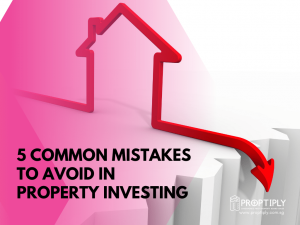
As one of the ways to build passive income, property investing can be potentially rewarding. Still, it is not entirely risk-free. Whether you’re buying a residential property or industrial property for investment, you should never ever jump in blind. Investing in property is a huge financial commitment and you don’t want to get your sums wrong because a costly mistake could take years to recover.
Avoid these 5 common mistakes property investors make.
Mistake #1: Not doing enough research
The top mistake property investors make is not doing enough research and due diligence in their investment property search. What should you be looking at? You need to consider market conditions, compare prices of past and present comparable units, check out vacancy rates and assess the rentability of the unit.
Valuable insights can also be gained by doing on-the-ground research – site walks come to mind. Look at factors such as the location and proximity to amenities and transport. Also consider the property cycle and state of the economy as these could influence your return on investment.
Mistake #2: Buying based on emotions
Another mistake property investors make is emotional buying. When you see friends making money on property, the fear of missing out could prompt you to jump in as well. But each individual has his or her own unique needs and financial circumstances. So don’t be tempted to copy what others are doing.
You may also have the image of the perfect property in your head. Don’t snap up the first unit that seems to meet your expectations. Don’t make decisions based on greed and or your “gut feeling” either. Always buy with your head, not your heart. Crunch the numbers, do your research (see point 1) and leave emotions at the door.
Mistake #3: Not seeking expert advice
It may be tempting to go it alone on your property investing journey in order to save costs. But you may not have the expertise nor knowledge to know whether contract clauses are onerous, whether loan terms are favourable to your financial situation, whether you are buying at a good price or overpaying for a unit, or whether the unit is in good shape or needs massive repairs. Even if you have some years of investing experience under your belt, don’t assume you know everything.
That’s why it’s super important to assemble your Ace team of professionals to guide you on each stage of your property investment journey. This may include a mortgage broker, lawyer, accountant, property agent and more. Make sure they are properly licensed and qualified with years of experience under their belt. If you’re in property investing for the long haul, you might even want to join a property investing course to build up your own knowledge over time.
Mistake #4: Speculating
When the property market is hot, it may be tempting to jump on the bandwagon in the hopes of making a quick buck and flipping the unit. For speculation to be successful, several cards have to fall in place – for instance, your timing has to be great and demand should be greater than supply. It is a very high-risk strategy.
A market which rises too fast may end up in a frothy bubble and could come back down just as quickly. If you make the mistake of buying at a high price hoping it would go higher, but the reverse came true, you could be saddled with a huge debt and it could take a long time to claw your way out from a bottoming market. Always enter the property market for the right reasons and look at the big picture. Consider all the risks before you part with your cash to avoid being overexposed.
Mistake #5: Not crunching the numbers
If you don’t know how to crunch the numbers, get a professional to do it for you. Understanding the numbers behind your investment is crucial for several reasons. For one, your purchase price will determine whether you can make a decent return on your investment when you finally decide to sell. So, the numbers influence your entry and exit strategy.
The numbers also help to identify whether you have a good deal or a bad one. A good deal is one where the property has the potential for capital appreciation and also has positive cash flow leftover after taking into account all the expenses you need to operate the unit for rental.